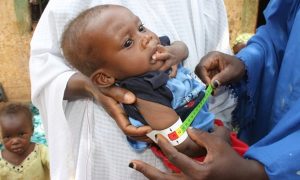
Bichi, Kano State, Nigeria – In the old approach to polio eradication, you wouldn’t expect Volunteer Community Mobilizer Hauwa Ibrahim to pull a multicolored strip from under her blue hijab and wrap it around two-year-old Usman Abdulabi’s upper arm. In the old approach, Hauwa’s visit to Usman’s home would have almost exclusively focused on counseling his parents about the importance of accepting the polio vaccine.
But by using her measuring Usman’s mid-upper arm circumference (MUAC) with that colorful strip of paper, Hauwa may have helped save Usman’s life.
In Nigeria’s Kano State, nearly one in five children dies before reaching their fifth birthday. Malnutrition rates here show that 37% of children under five are underweight (15% of them severely); 54% are stunted (33% severely); and 11% show wasting (3% severely).
In places like Kano State – where pockets of unimmunized children battle many life-threatening illnesses, including malnutrition – parents often refuse to give their children polio vaccine when they are sick. Polio vaccination can also become a kind of bargaining tool, where parents refuse to have their children vaccinated unless other services are provided. In July 2013, nearly 1% of all children under 5 in Kano State were denied polio vaccine due to their parents’ refusal to give it to them. Among these children, 33.9% were refused the vaccine because they were sick, and 3.2% were denied due to unmet demand for other services.
Clearly, polio eradication efforts must now be seen as a piece of the larger puzzle of child survival. Networks established to end polio are beginning to help provide other life-saving benefits for children.
In Usman’s case, this meant that Hauwa quickly ascertained – due to the expanded Volunteer Community Mobiliser (VCM) training she’d received — that Usman was suffering from Severe Acute Malnutrition. She then helped his parents get him treatment at a CMAM (Community-based Management of Acute Malnutrition) center.
Today, little Usman is a handful. Robust and full of life, he plays in front of his mud house, mimicking his mechanic father as he fixes a motorcycle. But he was not always like this.
“Six months ago, he used to look pale and thin and was always sick.” Usman’s 24-year-old father, Abdul Labi Abo, picks up his son with a smile. “I used to spend most of my time taking my wife and him to doctors. But all this changed after Hauwa told us to enroll him in the CMAM centre. His mother can now even leave him home with me and go visit family members, like she did today.”
By giving the right advice at the right time, Hauwa brought Usman’s parents on board as active supporters in her mission to increase caregiver acceptance to polio immunization.
“We like the way she works and her genuine care and concern,” says Abdul, adding that he tells his friends not to oppose polio immunization for their children, now that Hauwa has explained the benefits.
“Many of us used to think the polio vaccine was a plot by Western countries to make our children impotent. Not anymore.”
For more, please click here.



